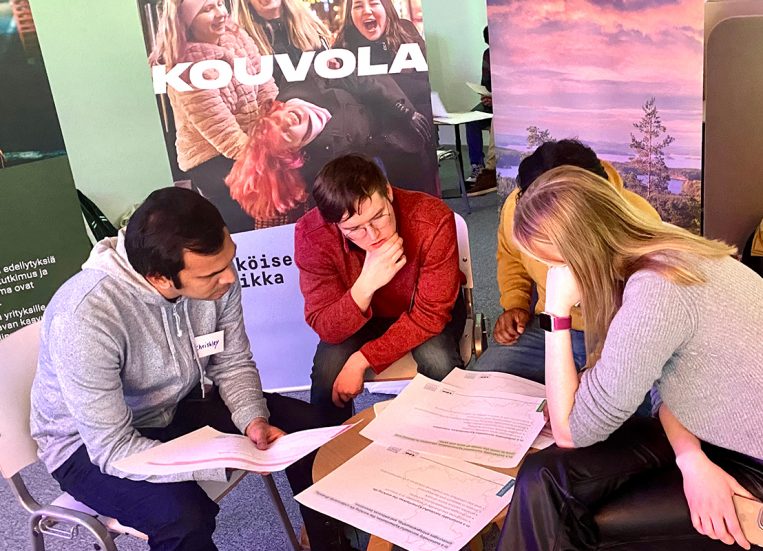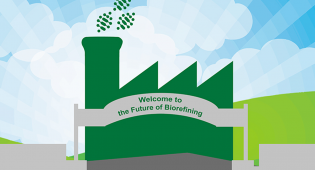Bidding for Progress: How Would International Students Reshape Kymenlaakso
27.05.2024What do international students want to invest in regarding the future of Kymenlaakso? A gamified team-building exercise challenged Xamk and LUT University students to contemplate the future vision statements for Kymenlaakso. The winning development areas focused on working life and operational culture because the students found employment, entrepreneurship, and collaboration to be challenging.
Team Building for a Sustainable Future
In January 2024, students from different campuses gathered for a hackathon to innovate new and attractive solutions for the city of Kouvola. Before the actual hackathon, we challenged student teams to reflect on their values and how these relate to the future of the Kymenlaakso region.
This exercise was based on the five future vision statements formed in the previous Kymenlaakso future workshop, in 2023. The goal of these statements is to support Kymenlaakso’s success in a sustainable way. The three different dimensions of sustainability—economic, ecological, and social—are parts of the new development movement.
The future statements of Kymenlaakso:
– Operational culture is fair and open. Collaboration is conducted in a spirit of deep trust.
– Education is lifelong and aims to meet the needs of work and skills.
– Region’s Identity supports reputation-building and is constructed upon the foundation of existing strengths.
– Working life understands diversity, encourages entrepreneurship, and embraces innovation.
– Nature influences decision-making and is understood to be a precondition for well-being.
(Leirimaa & Viljakainen 2023.)
Prioritization, Investing and Bidding
The future statements were given to teams on paper. Each topic was presented with a few sentences. The teams discussed the statement from their own perspective and organized the future statements in order of importance as a group conclusion.
“In the beginning, it was hard to decide which topic to invest in most. However, we felt that the operational culture included many points from the other topics, too. That’s why we decided that Operational culture was the number one for us.” This was told by one team.
Based on prioritization, the team invested the total sum allocated for development projects by distributing it in their preferred way. The investments were presented to the other groups with justifications.
At the end of this round, each team had the opportunity to continue supporting their favorites: new investments were made in turn by raising bids until all the funds reserved for the second round were spent.
Two Statements Emerge as Clear Leaders
After one round of investment, two future statements – Working life and Operational culture – were clearly in the lead. These two future statements also gathered the strongest justifications. After the bids of the second round, the duo maintained their positions, although their order changed. The bidding concluded in favor of Operational culture.
The statement on Regional identity surged to third place. Education was identified as a significant part of development, although it did not receive as much investment as the top two topics. Interestingly, investing in nature or the environment was deemed less urgent.
Justifications Were Embracing Employment, Entrepreneurship, and Collaboration
Employment-related themes emerged as paramount: Many international students have firsthand experience of the difficulty in finding a job alongside their studies. The lack of language skills is seen as an obstacle that is impossible to beat. It is also hard to connect with working life during studies (student projects, theses, etc.).
Many students call themselves ‘innovators’, and because of that, they focus on topics that support entrepreneurship and collaboration. Active connections with future employers and other networks would benefit from suitable places to meet people. More events and social life were requested.
Education, in particular, holds value as a strong builder of students’ futures, but it is seen as an already existing benefit, and the students invest more strongly in life after graduation.
Similar justifications were also given for Kymenlaakso’s nature: it is already in good condition, at least when compared to the students’ home countries. On the other hand, the local nature was seen as an attractive selling point for tourists. More tourists could also mean new business opportunities and work opportunities for students.
Expanded Framework on Development
A gamified exercise aimed at fostering team unity sparked intense discussions and expanded the framework of the future challenge. The wider perspective also helped the students develop better ideas for the hackathon challenge later.
For Kymenlaakso RDI stakeholders, this exercise produced valuable information from international students’ perspective. International students’ opinions are needed in the region to ensure a sufficient workforce, and by involving them in development, the existing capabilities are enriched!
Kymistämö-project is founded by Kymenlaakso Regional Council, Akke funds.






































